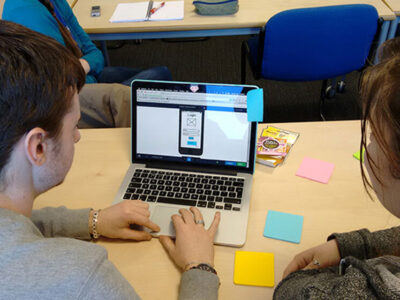Getting Started with Python with Lab eLearning
Python blijft een van de snelstgroeiende programmeertalen op de markt. Vanwege de gebruiksvriendelijkheid en de vele ondersteunende frameworks wordt het veel gebruikt in webontwikkeling, het schrijven van scripts, automatisering, data science en zelfs cybersecurity. Deze eLearning richt zich op het beginnen met Python, complexe datatypes, conditionele statements en lussen, en first-class functies en lambdas.
Overview
COURSE DESCRIPTION
Python continues to be one of the fastest-growing programming languages in the market today. Because of its ease of use and numerous supporting frameworks, it is widely used in web development, writing scripts, automating tasks, data science, and even cybersecurity.
In this collection the focus is getting started with Python, complex data types, conditional statements and loops, and first-class functions and lambdas.
CONTENT
E-learning courses (14+ hours)
- Getting Started with Python: Introduction
- Complex Data Types in Python: Working with Lists & Tuples in Python
- Complex Data Types in Python: Working with Dictionaries & Sets in Python
- Complex Data Types in Python: Shallow & Deep Copies in Python
- Conditional Statements & Loops: If-else Control Structures in Python
- Conditional Statements & Loops: The Basics of for Loops in Python
- Conditional Statements & Loops: Advanced Operations Using for Loops in Python
- Conditional Statements & Loops: While Loops in Python
- Functions in Python: Introduction
- Functions in Python: Gaining a Deeper Understanding of Python Functions
- Functions in Python: Working with Advanced Features of Python Functions
Online Mentor
- You can reach your Mentor by entering chats or submitting an email.
Final Exam assessment
- Final Exam: Python Novice will test your knowledge and application of the topics presented throughout the Python Novice course collection. Estimated duration: 90 minutes
Practice Labs: Python Novice (estimated duration: 8 hours)
- Practice novice Python development tasks such as formatting data types, implementing flow control and conditionals, copying containers, and performing loops with list comprehension methods. Then, test your skills by answering assessment questions after converting data types, working with global and local variables within functions, invoking functions with varying parameters and implementing recursive functions and closures. This lab provides access to tools typically used when developing with Python, including:
o Python, Anaconda
o Jupyter Notebook + JupyterHub
o Pandas
o NumPy
o SiPy
o Seaborn Library
o PyCharm IDE
o Spyder IDE
o MongoDB
o MySQL,
o VS Code






